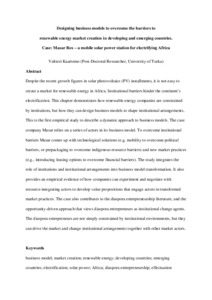Designing business models to overcome the barriers to renewable energy market creation in developing and emerging countries: Masar box, a case study
Kaartemo Valtteri
https://urn.fi/URN:NBN:fi-fe2021042825112
Tiivistelmä
Despite the recent growth figures in solar photovoltaics (PV) installments, it is not easy to create a market for renewable energy in Africa. Institutional barriers hinder the continent’s electrification. This chapter demonstrates how renewable energy companies are constrained by institutions, but how they can design business models to shape institutional arrangements. This is the first empirical study to describe a dynamic approach to business models. The case company Masar relies on a series of actors in its business model. To overcome institutional barriers Masar comes up with technological solutions (e.g. mobility to overcome political barriers, or prepackaging to overcome indigenous resource barriers) and new market practices (e.g., introducing leasing options to overcome financial barriers). The study integrates the role of institutions and institutional arrangements into business model transformation. It also provides an empirical evidence of how companies can experiment and negotiate with resource-integrating actors to develop value propositions that engage actors in transformed market practices. The case also contributes to the diaspora entrepreneurship literature, and the opportunity-driven approach that views diaspora entrepreneurs as institutional change agents. The diaspora entrepreneurs are not simply constrained by institutional environments, but they can drive the market and change institutional arrangements together with other market actors.
Kokoelmat
- Rinnakkaistallenteet [19249]
